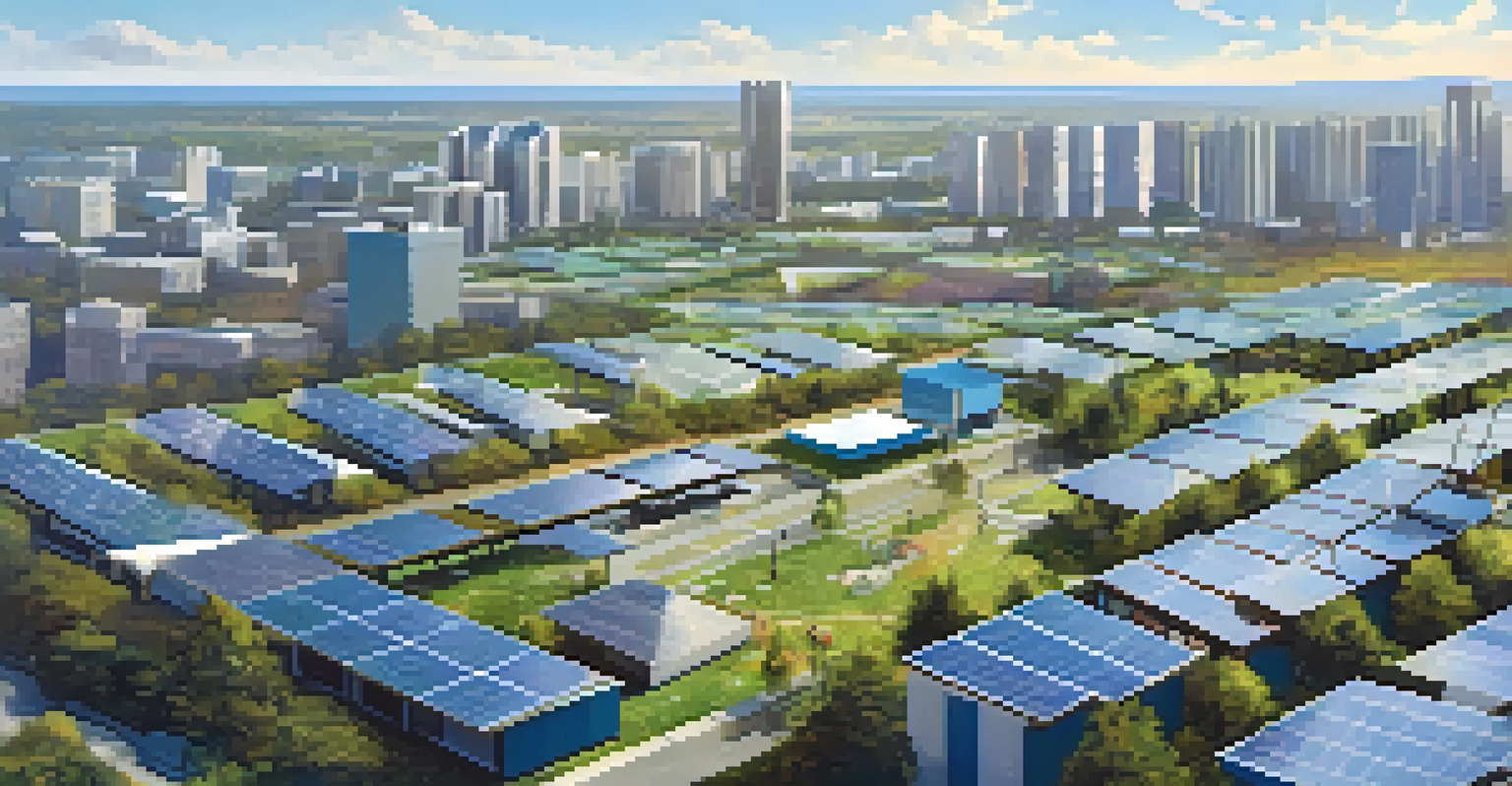Smart Cities: The Future of Urban Development in Georgia

What Are Smart Cities and Why They Matter
Smart cities leverage technology to enhance urban living, focusing on sustainability, connectivity, and efficiency. They integrate data and digital solutions to improve public services, transportation, and environmental management. For instance, smart traffic lights can adapt to real-time traffic conditions, reducing congestion and emissions.
The cities of the future will be smart, sustainable, and more responsive to the needs of their residents.
In Georgia, smart cities are emerging as a solution to urban challenges, such as population growth and infrastructure strain. By utilizing IoT (Internet of Things) devices, cities can gather data to make informed decisions, improving everything from public safety to energy consumption. This modern approach not only enhances quality of life but also attracts businesses and residents.
Ultimately, smart cities represent a shift towards a more responsive and responsible urban environment. They prioritize the needs of citizens while addressing economic and environmental concerns. As cities in Georgia embrace this model, they pave the way for a more sustainable and innovative future.
Key Technologies Driving Smart Cities in Georgia
Several cutting-edge technologies are at the heart of smart city development. IoT devices, for example, are essential for collecting real-time data from various urban systems, such as water supply and waste management. This information helps city planners optimize resources and improve services.

Another vital technology is artificial intelligence (AI), which can analyze vast amounts of data to identify patterns and predict future needs. For example, AI can assist in traffic management, predicting peak hours and suggesting alternative routes to minimize congestion. This proactive approach can significantly enhance urban mobility.
Smart Cities Improve Urban Living
Smart cities utilize technology and data to enhance public services, sustainability, and overall quality of life.
Finally, 5G connectivity plays a crucial role, enabling faster data transmission and supporting a plethora of smart applications. With high-speed internet, cities can implement solutions like smart surveillance and emergency response systems. In Georgia, these technologies are not just trends; they're essential components of creating intelligent urban spaces.
Sustainable Urban Development and Smart Cities
Sustainability is a cornerstone of smart city initiatives in Georgia. By integrating renewable energy sources and smart grids, cities can reduce their carbon footprints significantly. For instance, solar panels on city buildings can power public amenities, promoting a greener urban landscape.
Technology is best when it brings people together and creates a community.
Additionally, smart waste management systems are being introduced, using sensors to monitor bin levels and optimize collection routes. This not only reduces operational costs but also minimizes environmental impact. It's a win-win situation for the city and its residents.
Moreover, green spaces are being enhanced through smart landscaping technologies that monitor soil health and moisture levels. This ensures that parks and recreational areas are maintained efficiently, contributing to the overall well-being of the community. Sustainability and technology are harmoniously intertwined in Georgia's vision for smart cities.
Challenges in Implementing Smart City Solutions
While the prospect of smart cities is exciting, several challenges must be addressed. One significant hurdle is the digital divide; not all residents have equal access to technology. Ensuring that all citizens can benefit from smart initiatives is crucial for inclusive urban development.
Data security is another pressing concern. As cities collect vast amounts of personal and public data, protecting this information from cyber threats becomes paramount. Without robust security measures, citizens may feel hesitant about embracing smart technologies.
Community Engagement is Crucial
Involving residents in planning smart city initiatives fosters trust, ownership, and ensures solutions meet community needs.
Lastly, funding and resources can be limiting factors in implementing smart city projects. Local governments must explore innovative financing options and partnerships to bring these initiatives to life. Overcoming these challenges will be key to realizing the full potential of smart cities in Georgia.
Case Studies: Georgia's Smart City Initiatives
Several cities in Georgia are already taking significant strides towards becoming smart cities. For instance, Atlanta has implemented smart traffic management systems that reduce congestion and improve air quality. These technologies not only enhance public transportation but also foster a more pedestrian-friendly environment.
Savannah is also leading the way with its smart lighting project, which uses energy-efficient LED lights controlled by a centralized system. This approach not only saves energy costs but improves public safety by ensuring well-lit streets. Such initiatives demonstrate the practical benefits of smart technologies in urban settings.
These case studies serve as models for other cities in Georgia looking to adopt smart solutions. By learning from successful implementations, cities can tailor their approaches to meet specific needs and challenges. The progress made by these urban centers showcases the potential for smart city development across the state.
The Role of Community Engagement in Smart Cities
Community engagement is vital for the success of smart city initiatives. Involving residents in the planning process ensures that their needs and preferences are considered. Public forums, surveys, and workshops can gather valuable input from citizens, fostering a sense of ownership and responsibility.
Moreover, transparent communication helps build trust between city officials and residents. By keeping the community informed about projects and progress, cities can encourage public participation and enthusiasm for smart technologies. This collaboration can lead to more effective solutions tailored to the community's unique challenges.
Challenges Must be Addressed
Overcoming issues like the digital divide, data security, and funding is essential for the successful implementation of smart city projects.
Ultimately, a successful smart city is one where citizens feel empowered and engaged. By prioritizing community involvement, Georgia's cities can create environments that not only utilize technology but also resonate with the people who live and work there.
The Future of Smart Cities in Georgia
Looking ahead, the future of smart cities in Georgia is promising, with ongoing advancements in technology and infrastructure. As more cities adopt smart solutions, we can expect to see significant improvements in urban living. Enhanced public services, reduced congestion, and increased sustainability are just a few of the benefits on the horizon.
Moreover, the collaboration between local governments, tech companies, and community members will drive innovation. By leveraging diverse expertise, cities can develop creative solutions to complex urban challenges. This cooperative spirit is essential for building resilient and adaptive urban environments.

In conclusion, the journey towards smart cities in Georgia is well underway. The commitment to embracing technology, sustainability, and community engagement sets the stage for a vibrant urban future that benefits everyone. Together, cities and citizens can create smart environments that enhance quality of life and promote sustainable growth.